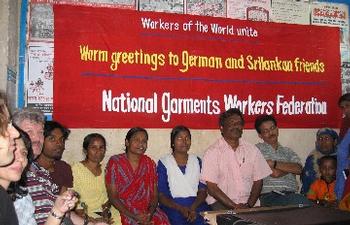What
is ExChains about?
 Garments
sold in shops like H&M, Metro, Neckermann, Karstadt Quelle or
Otto make a long journey before they end up on display. Workers
may have produced cotton fibres in Kenya; other workers may have
spun, woven and sewn the garments in factories in Sri Lanka, China
or Bangladesh; until they come to be sold by retail workers in Europe. Garments
sold in shops like H&M, Metro, Neckermann, Karstadt Quelle or
Otto make a long journey before they end up on display. Workers
may have produced cotton fibres in Kenya; other workers may have
spun, woven and sewn the garments in factories in Sri Lanka, China
or Bangladesh; until they come to be sold by retail workers in Europe.
This ‘Global Garment Factory’ thrives on the exploitation
of garment workers in the global south. The workers, mostly young
women, are not receiving a living wage, make long hours often working
six days a week, are not seldom physically abused, do not have the
right to organize… But also garment and retail workers in
the north have their problems. For instance, in Germany workers
and workers representatives of the cheap-chic clothing company H&M
often face aggressive union bashing, and the low wages and exploitative
working conditions of retailer Wal-Mart are infamous nowadays.
In 2002 workers from Bangladesh, Germany and Sri Lanka met for
the first time at a tie-conference in Germany and discovered that
they hardly new anything about each other’s working conditions
while they were all working in the same global industry. It was
then decided to start an international cooperation with the objective
of mutually supporting each other along the subcontracting chain
of the textile, garment and retail sector. Since then workers from
Mexico joined the network and there are intense contacts with organisations
in Turkey and Sweden.
ExChains consists primarily of women workers since they make up
the vast majority of workers in the Global Garment Factory and are
at the same time underrepresented in the trade union movement. Traditional
culture, patriarchy and downright sexism make that women often suffer
from physical and emotional abuse on the job as well as in the union,
if there is any.
The goal of the project is that young women workers in the garment
industry gain control over their own work and lives. Therefore it
is crucial for workers to have the right to organize and for women
workers to be able to hold leadership positions within their organisations.
But also knowledge of the global economy and the role of the garment
industry and its workers is essential for the emancipation and liberation
of workers.
|
